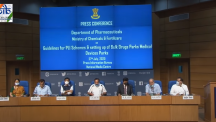Snapshot
Formulating success: The Indian pharmaceutical industry.
The Indian Pharmaceuticals industry plays a prominent role in the global pharmaceuticals industry.
Major segments of Indian Pharmaceutical Industry include generic drugs, OTC medicines, bulk drugs, vaccines, contract research & manufacturing, biosimilars and biologics. India is a global leader in the supply of DPT, BCG, and Measles vaccines.
India is one of the biggest suppliers of low-cost vaccines in the world. India accounts for 60% of global vaccine production, contributing up to 70% of the WHO demand for Diphtheria, Tetanus and Pertussis (DPT) and Bacillus Calmette–Guérin (BCG) vaccines, and 90% of the WHO demand for the measles vaccine.
The nation is the largest provider of generic medicines globally, occupying a 20% share in global supply by volume, and is the leading vaccine manufacturer globally. India also has the highest number of US-FDA compliant Pharma plants outside of USA and is home to more than 3,000 pharma companies with a strong network of over 10,500 manufacturing facilities as well as a highly skilled resource pool.
There are 500 API manufacturers contributing about 8% in the global API Industry. India is the largest supplier of generic medicines. It manufactures about 60,000 different generic brands across 60 therapeutic categories and accounts for 20% of the global supply of generics. Access to affordable HIV treatment from India is one of the greatest success stories in medicine. Because of the low price and high quality, Indian medicines are preferred worldwide, making it “pharmacy of the world”.
100% Foreign Direct Investment (FDI) in the pharmaceutical sector is allowed under the automatic route for greenfield pharmaceuticals.
100% FDI in the pharmaceutical sector is allowed in brownfield pharmaceuticals; wherein 74% is allowed under the automatic route and thereafter through the government approval route.
For further details, please refer FDI Policy
- %
Total FDI inflows
- $ Bn
Export of Drugs & Pharmaceuticals (FY 2023-24)
- $ Bn
FDI (Apr 2000 to Jun 2024)
India accounts for 60% of global vaccine production making it the largest vaccine producer in the world
India is one of the biggest suppliers of low-cost vaccines in the world and is the largest provider of generic medicines globally, occupying a 20% share in global supply by volume
- Industry Scenario
- FOREIGN INVESTMENT
- INDUSTRY TRENDS
- POLICIES & SCHEMES
Industry Scenario
The turnover of pharmaceutical industry in India reached INR 4,17,345 Cr in 2023-24, registering a growth of 10% over 2022-23.
The pharmaceutical industry in India is currently valued at $50 Bn.
India is a major exporter of Pharmaceuticals, with over 200+ countries served by Indian pharma exports. India supplies over 50% of Africa’s requirement for generics, ~40% of generic demand in the US and ~25% of all medicine in the UK.
India also accounts for ~60% of global vaccine demand, and is a leading supplier of DPT, BCG and Measles vaccines. 70% of WHO’s vaccines (as per the essential Immunization schedule) are sourced from India.
GROWTH DRIVERS
Government Support
The support under PLI schemes is expected to promote the production of high-value products in the country and increase the value addition in exports as well as generate employment for both skilled and unskilled personnel, estimated at 20,000 direct and 80,000 indirect jobs as a result of growth in the sector. Three bulk drug parks, located in Gujarat, Himachal Pradesh, and Andhra Pradesh should provide a consistent supply of bulk drug active components and will ensure India's drug security.
Medical tourism
Quality services at marginal costs compared to US, Europe, and South Asia
Infrastructure development
India has the highest number of US-FDA compliant plants outside the US
Strong drug manufacturing
Expertise in low cost generic patented drugs as well as end-to-end manufacturing
Strong domestic demand
Launch of the largest National Health Protection Scheme globally


Production Linked Incentive (PLI) Scheme
The Indian pharmaceuticals market is supported by the following Production Linked Incentive Schemes to boost domestic manufacturing capacity, including high-value products across the global supply chain.
1. PLI Scheme for Key Starting Materials (KSMs)/Drug Intermediates (DIs) and Active Pharmaceutical Ingredients (APIs) (PLI 1.0) - Under the PLI scheme for Bulk Drugs, the objective is to boost domestic production of 41 select critical bulk drugs in the country. 51 projects have been selected for the 34 notified bulk drugs. Out of this, 22 projects have been commissioned till 31st Jan 2023. An investment of INR 2019 Cr have been reported while employing 1900 persons in the same period.
2. Production-Linked Incentive (PLI) Scheme for Pharmaceuticals d (PLI 2.0) - Under the PLI scheme for Pharmaceuticals, 55 applicants have been selected, including 20 Micro, Small & Medium Enterprises (MSMEs). As of 31st Jan 2023, sales of about INR 36,000 Cr have been reported by the select applicants. The scheme has garnered an investment of INR 16,199 Cr by these applicants in the first year of implementation while employing 23,000 persons in the same period.
Scheme Outlay INR 6,940 Cr
PLI for Bulk Drugs
Scheme Outlay INR 15,000 Cr
PLI Scheme for Pharmaceuticals Manufacturing











